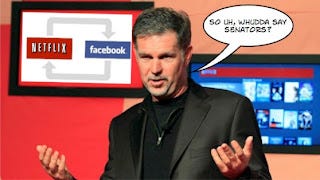Video streaming companies like Netflix can share your viewing habits.

Last Tuesday, the Senate quietly altered a key privacy law, making it much easier for video streaming services like Netflix to share your viewing habits. How quietly? The Senate didn't even hold a recorded vote: The bill was approved by unanimous consent. (Joe Mullin of Ars Technica was among the first to note the vote.)
Here's what changed. For the last 24 years, ever since a local reporter easily obtained failed Supreme Court nominee Robert Bork's video rental records without his consent, the law has required video rental companies to get your permission each and every time they share information about the movies you rent or buy. Although Bork himself had no respect for the idea of a constitutional right to privacy, part of his legacy ended up being one of the strongest privacy-related laws in the country.
It looks like Netflix will finally manage to get the small change to US privacy law that it's been seeking for nearly two years now. Last night, the Senate passed a reform to the Video Privacy Protection Act, or VPPA, that Netflix says it needs in order to integrate its services with Facebook.
Right now, the VPPA stops anyone's movie-rental history from being disclosed without specific written consent. Netflix expressed to its shareholders back in July 2011 [PDF] that the VPPA made it "ambiguous" how it could get consent from US users to allow a sharing function on Facebook. Given that online privacy has been a growing area of litigation in the past few years, the concern was warranted.
The reform bill that just passed, H.R. 6671, should clear up Netflix's concerns as well as those of other streaming-video providers that want to reach out to your inner over-sharer. It also shows the contours of what a Netflix sharing function, on Facebook or otherwise, might look like. The bill makes clear that: 1) consent for sharing video-watching history can be granted over the Internet; and 2) consent can be given for a whole period of time, up to two years, and doesn't need to be given every time sharing happens. It also specifies that the disclosure has to be in a "distinct" form. In other words, don't put it in the fine print. Consumers will be allowed to withdraw consent for sharing when they want to, on a case-by-case basis, or altogether.
As of last week, that's all in the past: Video streaming companies that want to share your data now only need to ask for your permission once. After that, they can broadcast your video-watching habits far and wide for up to two years before having to ask again.
Now that Netflix can be sure it won't run afoul of such penalties, we can all look forward to a Facebook newsfeed full of friends who broadcast every episode of television they watch.
The video streaming and social media companies really, really wanted this change. Media companies have lobbied hard on the measure; Netflix alone spent more than half a million dollars this year lobbying Congress on this and similar proposals.
http://www.motherjones.com/mojo/2012/12/netflix-video-privacy-facebook-sharing


